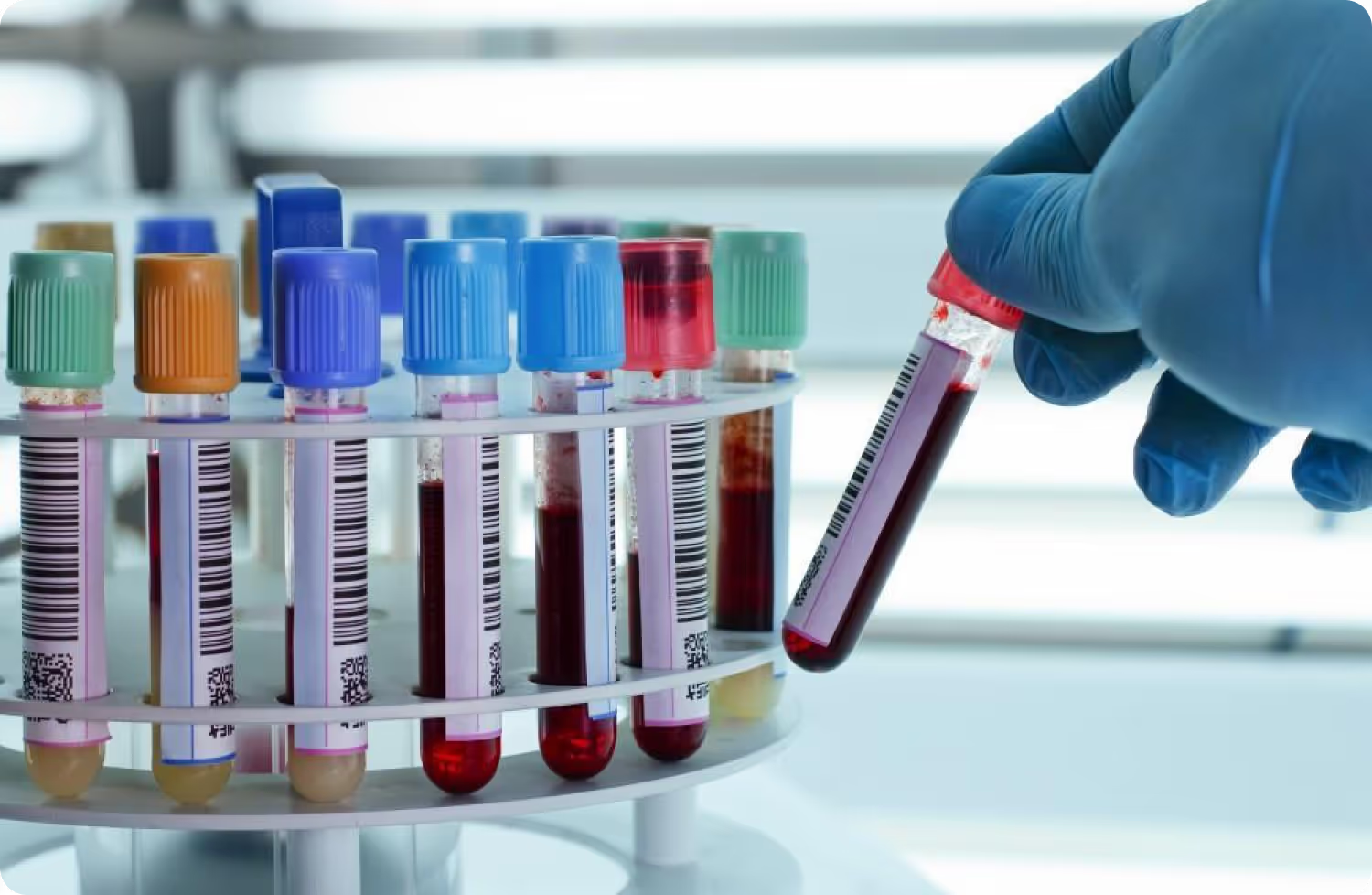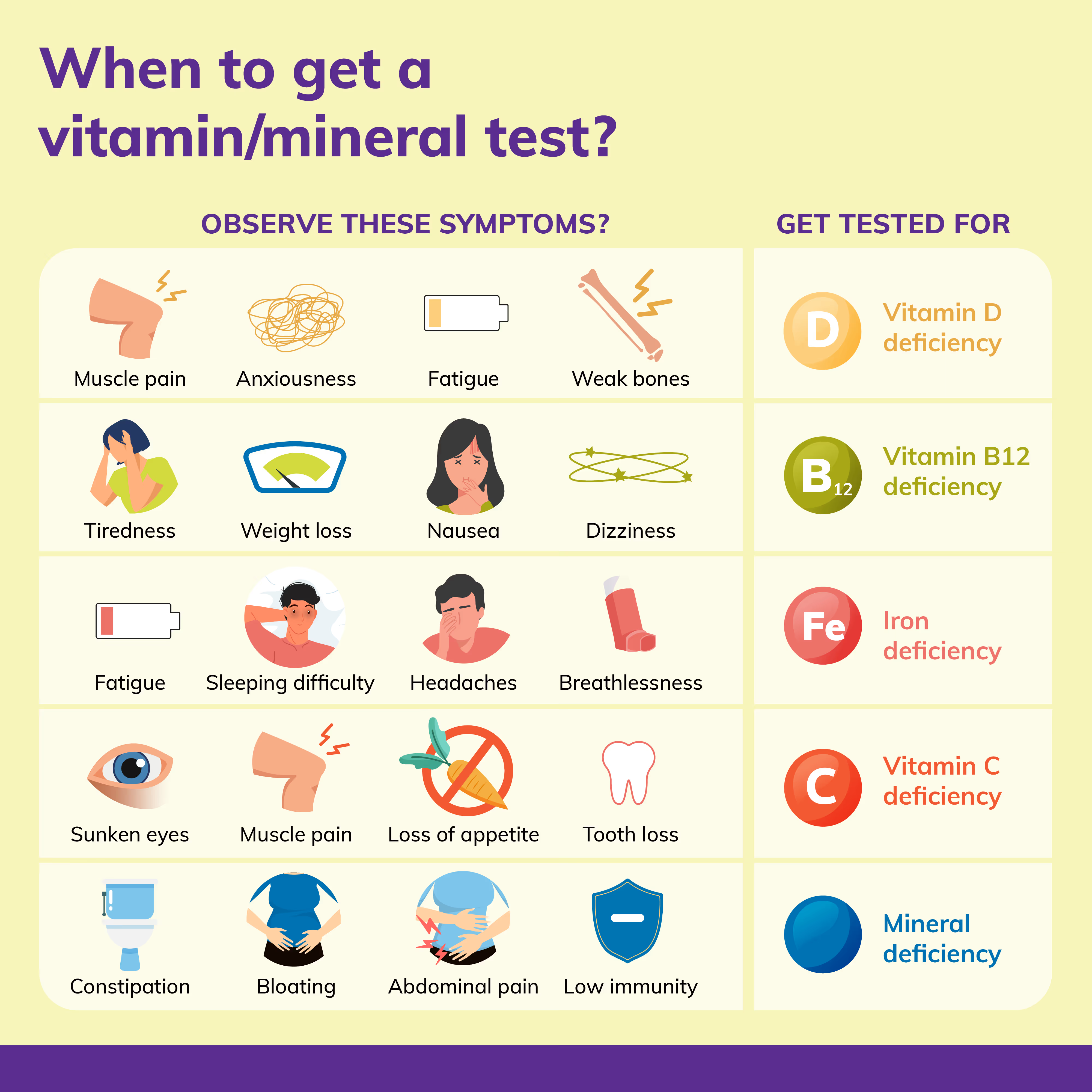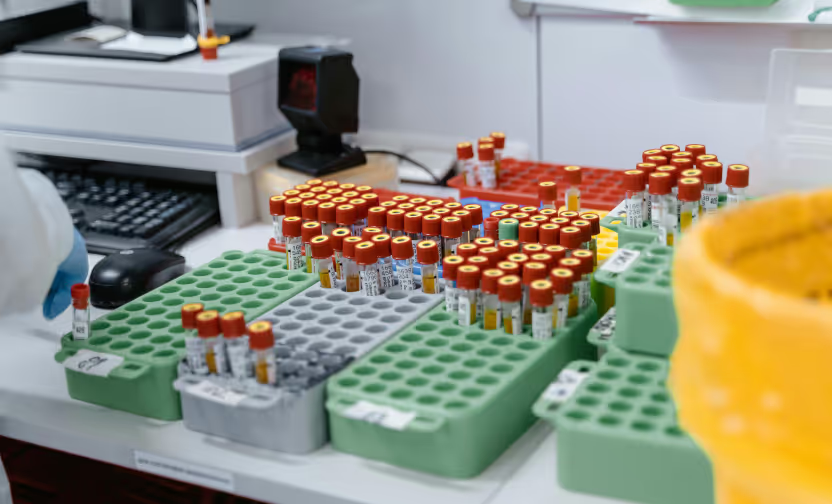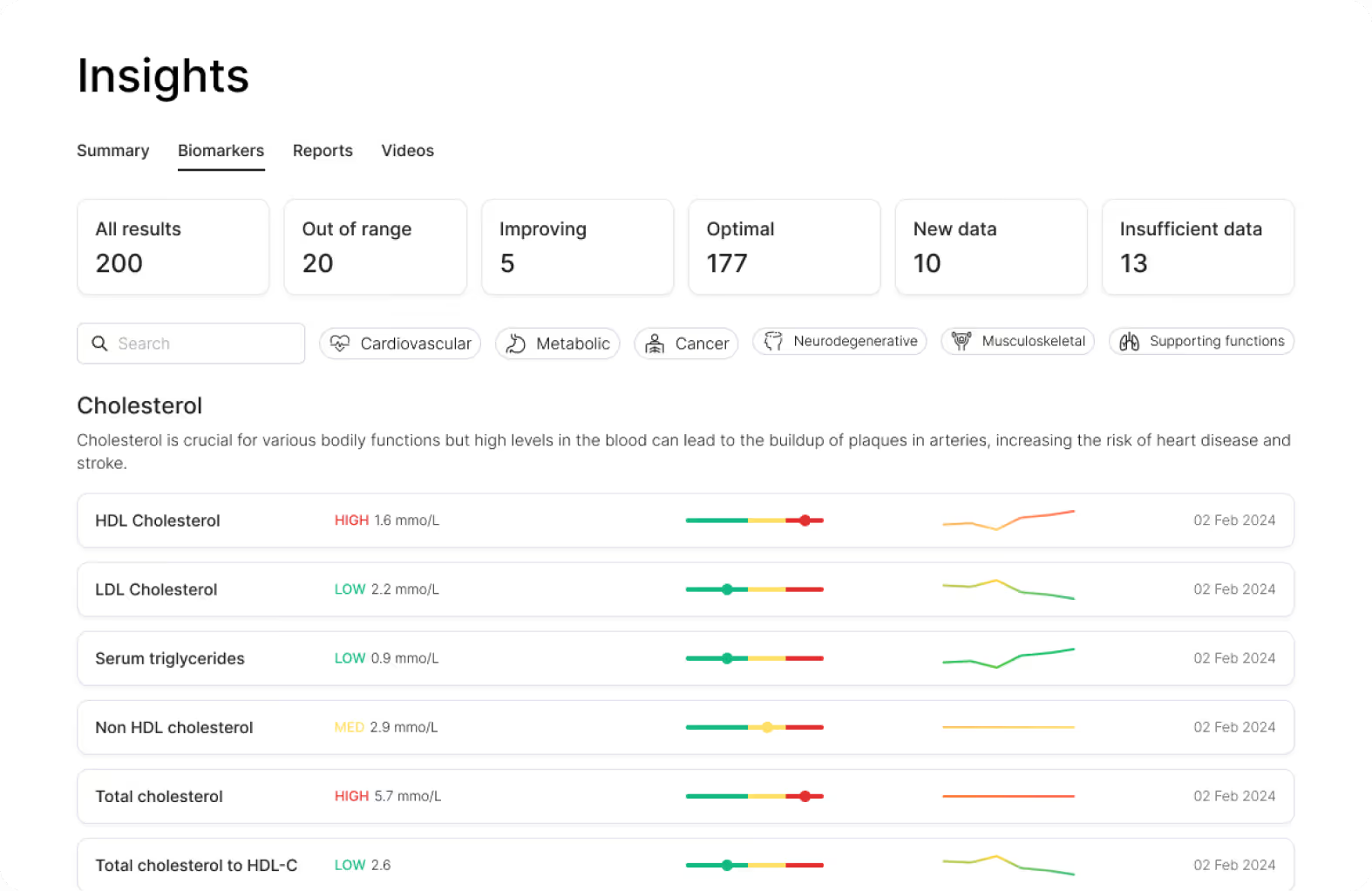Types of Blood Tests
Specific blood tests focus on particular health issues, with more than 50 common tests available. These include cholesterol panels, liver function tests, and thyroid assessments. Tailored to individual needs, specific blood tests allow early detection and management of conditions, providing precise insights into targeted areas of the body.

Blood Tests: All You Need to Know for Better Health Insights
What:
Blood testing
Tests for:
Various cell types and biomarkers
Referral:
Not required
Member cost:
Varies depending on the biomarkers tested
What are the most common Blood Tests?
For a comprehensive blood biomarker screening, including benchmark comparisons that show how each biomarker ranks for your age and gender, visit the Everlab Longevity Health Program.
Full Blood Count (FBC)
A full blood count (FBC) measures the levels of different types of cells in your blood, including red blood cells, white blood cells, and platelets. It's often used as a general health check to detect a wide range of disorders, such as infections, anaemia, and immune system conditions.
White Blood Cell Count
White blood cells fight infections. Abnormal levels can indicate infection, inflammation, or immune system disorders. High levels may signal infection or stress on the body, while low levels could be due to bone marrow problems or autoimmune diseases. White blood cell counts provide insight into your immune system’s strength.
MCH (Mean Corpuscular Haemoglobin)
MCH measures the average amount of haemoglobin inside each red blood cell. Haemoglobin is responsible for carrying oxygen, and abnormal MCH levels can indicate types of anaemia.
Erythrocyte Sedimentation Rate (ESR)
ESR measures how quickly red blood cells settle at the bottom of a test tube, indicating the presence of inflammation. It’s used to diagnose or monitor conditions like rheumatoid arthritis, infections, and autoimmune diseases.
Metabolic Health
This panel checks key body functions, including kidney function, glucose, and electrolytes, crucial for overall health monitoring.
Glucose
Glucose levels indicate how your body handles sugar. Both high glucose and low glucose levels may signal diabetes. Regular glucose monitoring is crucial for diagnosing diabetes and ensuring proper blood sugar control, preventing complications like heart disease and nerve damage. A CGM is used to monitor your blood glucose levels as an alternative to a blood test.
HbA1c (Glycated Haemoglobin)
HbA1c measures average blood sugar levels over the past 2-3 months. It's a critical test for diagnosing and managing diabetes. Elevated HbA1c levels indicate poor long-term blood sugar control, increasing the risk of complications such as kidney disease, neuropathy, and cardiovascular issues. Regular HbA1c testing helps adjust treatment and monitor diabetes management.
Cholesterol Levels
A lipid panel measures total cholesterol and triglycerides. LDL (bad cholesterol), HDL (good cholesterol) may need to be ordered separately. High levels of LDL or triglycerides increase the risk of heart disease, while higher HDL levels are protective. Regular testing helps guide dietary changes and medication adjustments.
Cortisol Levels
Cortisol is the body’s main stress hormone. Abnormal levels can indicate adrenal dysfunctions, such as Cushing’s syndrome or Addison’s disease. Testing cortisol levels helps manage stress-related disorders and guide treatments.
Insulin Levels
Insulin regulates blood sugar levels, and testing can help assess insulin resistance, a precursor to type 2 diabetes. High levels can signal metabolic syndrome or pre-diabetes, while low levels might indicate issues with insulin production.
Lipoprotein(a) (Lp(a))
Lp(a) is a type of LDL cholesterol that is genetically determined and associated with an increased risk of heart disease. Elevated Lp(a) levels can significantly impact cardiovascular risk, even in individuals with normal cholesterol levels.
High-Sensitivity Troponin
Troponin is a protein released into the blood when heart muscle is damaged. High-sensitivity troponin tests can detect even minor heart damage, making it crucial for diagnosing heart attacks and other heart-related conditions. This is more commonly tested in hospitals.
Vitamin and Mineral Tests
There are many vitamins and minerals that support bodily functions, such as energy, immunity, and bone health.

Vitamin D
Vitamin D is vital for bone health and immune function. Deficiency can lead to bone weakness or immune system issues. Regular testing helps prevent deficiencies that can lead to conditions like osteoporosis or increased susceptibility to infections.
Iron
Iron is essential for red blood cell production and oxygen transport. Low iron levels can cause anaemia, leading to fatigue and weakness. Monitoring iron levels ensures adequate oxygen supply to your tissues and prevents anaemia-related health issues.
Magnesium
Magnesium is crucial for muscle and nerve function, bone health, and heart rhythm regulation. Low levels can cause muscle cramps, fatigue, and cardiovascular issues. Testing helps guide dietary changes or supplementation.
Zinc
Zinc is essential for immune function, wound healing, and DNA synthesis. Deficiency can impair immune response, slow wound healing, and affect growth in children. Monitoring zinc levels helps ensure optimal immune health.
Liver Function Tests
These tests measure enzymes and proteins that assess liver health and its ability to filter blood and process nutrients.
ALT and AST
These enzymes are released into the blood when liver cells are damaged. Elevated levels can indicate liver inflammation, infection, or disease, such as hepatitis or fatty liver disease. Monitoring these enzymes helps detect liver issues early and assess the need for treatment.
Bilirubin
Bilirubin is a by-product of red blood cell breakdown. High levels may indicate liver or bile duct issues, leading to jaundice. Regular testing ensures your liver is functioning correctly and helps diagnose conditions like cirrhosis or bile obstruction early.
ALP and GGT
These enzymes are released when the liver or bile ducts are affected. Elevated levels can indicate bile duct issues or liver diseases, such as cholestasis or cirrhosis. Monitoring these enzymes helps identify blockages or liver damage early and assess the need for treatment.
Albumin
Albumin is a protein produced by the liver. Low levels may indicate liver disease or a reduction in liver function, as seen in conditions like cirrhosis or malnutrition. Regular albumin testing helps assess the liver’s ability to produce proteins and can aid in diagnosing liver-related health issues early.
Prothrombin Time (PT) and Activated Partial Thromboplastin Time (aPTT)
These tests measure how quickly blood clots. They are essential for diagnosing bleeding disorders, monitoring blood-thinning medications, and assessing liver function.
Other common tests
- Thyroid Function Tests: TSH regulates thyroid hormones. Abnormal levels indicate thyroid issues like hypothyroidism or hyperthyroidism, affecting metabolism. Monitoring helps diagnose and manage thyroid disorders early.
- Electrolytes: Electrolytes like sodium, potassium, and chloride regulate hydration, muscle function, and nerve signals. Imbalances can cause dehydration, heart issues, or confusion. Regular testing detects fluid and organ function problems.
- C-Reactive Protein (CRP): CRP is an inflammation marker. High levels can signal infections, chronic inflammation, or heart disease risk. Monitoring CRP helps manage and assess inflammatory conditions.
- Creatinine: Creatinine, a waste product filtered by the kidneys, indicates kidney health. Elevated levels suggest impaired kidney function, requiring monitoring for disease management.
- Blood Urea Nitrogen (BUN): BUN measures nitrogen from urea, reflecting kidney function and hydration. Abnormal levels can indicate kidney disease, dehydration, or high protein intake.
- Sex Hormones (Testosterone, Estrogen, Progesterone): These hormones affect reproductive health, mood, and bone strength. Imbalances can cause mood swings, infertility, or low libido. Testing aids in diagnosing conditions like PCOS and low testosterone.
- Parathyroid Hormone (PTH): PTH regulates blood calcium, crucial for bone health. Abnormal levels can indicate disorders affecting bone density and calcium balance.
- Calcium and Phosphate Levels: Calcium and phosphate are vital for bone, muscle, and nerve function. Imbalances can lead to bone issues, muscle spasms, or heart rhythm problems.
- HIV, Hepatitis B & C, and Syphilis Tests: These tests screen for common viral and bacterial infections that can have significant health implications if left untreated. Early detection allows for timely intervention and management.
- BRCA Gene Test: The BRCA gene test identifies genetic mutations linked to higher risks of breast and ovarian cancers. Understanding genetic risk helps in taking proactive steps for monitoring and prevention.
- Pharmacogenomic Tests: These tests assess how your genes affect your response to medications, enabling personalized treatment plans. This is particularly useful for managing conditions like depression, cancer, and cardiovascular disease.
What blood tests are used to help diagnose specific conditions?
Blood tests are essential tools in diagnosing a wide range of specific conditions, from allergies and autoimmune disorders to cancer, diabetes, and heart disease. By measuring various markers and antibodies, these tests provide critical insights that guide diagnosis, treatment, and ongoing management of health issues.

Allergies
Blood tests for allergies, such as the IgE test, measure your immune system’s response to specific allergens like food, pollen, or animal dander. Elevated IgE levels suggest an allergic reaction, and results help guide treatment plans, such as identifying triggers and recommending lifestyle changes or medications to manage symptoms and prevent allergic flare-ups.
Autoimmune disease
Autoimmune diseases, where the body attacks its own tissues, can be identified through blood tests like the ANA (Antinuclear Antibody) test or Rheumatoid Factor test. These tests detect specific antibodies related to conditions such as lupus or rheumatoid arthritis. A positive result typically leads to further tests to confirm the specific autoimmune disorder and appropriate treatment.
Cancer
Blood tests can help detect certain cancers by measuring tumour markers like PSA (Prostate-Specific Antigen) for prostate cancer or CA-125 for ovarian cancer. While these tests provide useful clues, they are not definitive. They are typically used in conjunction with imaging or biopsies to confirm a diagnosis and guide the appropriate treatment plan.
Diabetes & Pre-diabetes
Blood tests like HbA1c, fasting blood glucose, and oral glucose tolerance tests are used to diagnose diabetes and prediabetes. HbA1c measures your average blood sugar levels over several months, while fasting blood glucose and tolerance tests assess how your body processes sugar. These tests help diagnose, monitor, and manage blood sugar-related conditions effectively.
Endocrine disease
Endocrine disorders, such as thyroid imbalances or adrenal dysfunction, are diagnosed using blood tests. The TSH test measures thyroid function, while the cortisol test evaluates adrenal health. Abnormal hormone levels can indicate conditions like hypothyroidism, hyperthyroidism, or adrenal insufficiency. These tests provide critical insights for diagnosing and treating hormone-related disorders.
Heart disease
Blood tests play a crucial role in assessing heart disease risk. Lipid panels measure cholesterol and triglyceride levels, while troponin tests detect heart damage. Elevated C-reactive protein (CRP) levels may indicate inflammation related to cardiovascular risk. These tests help evaluate heart health and inform decisions about lifestyle changes or treatments for preventing heart disease.
Specialised Blood Tests
ApoE Genotyping Test
This test identifies variations in the ApoE gene, which can help determine your genetic risk for Alzheimer’s disease. It’s linked to an increased risk of developing late-onset Alzheimer's. While this test doesn't diagnose the disease, it provides valuable information for assessing genetic risk and planning preventative strategies.
Heavy Metals Blood Test
The heavy metals blood test measures levels of toxic metals like lead, mercury, cadmium, and arsenic in your bloodstream. Elevated levels can indicate exposure to dangerous substances, which may result in serious health issues, such as kidney damage, neurological problems, or cardiovascular diseases.
Omega-3 Index Test
The Omega-3 Index test measures the percentage of omega-3 fatty acids (EPA and DHA) in your red blood cells. A higher omega-3 index is linked to better heart health, reduced inflammation, and lower risk of chronic diseases.
How do you know which blood tests you need?
Doctor referral and guidance
Traditionally, your doctor assesses your symptoms, medical history, and risk factors to determine which blood tests are most relevant. They might also consider routine screenings for certain conditions based on your age or lifestyle, and base that on which tests you may need to consider.
Everlab referral
The Everlab preventative health program includes extensive blood biomarker testing. You can find a list of all the tests here. Everlab’s approach involves extensive preventative testing to enable early detection of potential issues before symptoms arise. Everlab is able to catch various diseases early which conventional testing may not be able to detect.
What else do I need to understand?
Where can you get specialised blood tests done?
Specialised tests can generally be done at a health clinic. For more information on how the blood test process generally works, read here.
What should I do to prepare for my blood test?
Preparation for a blood test depends on the type of test you're having. Some tests may require fasting for 8-12 hours, while others have no special requirements. Always follow the instructions provided by your healthcare provider or testing clinic. Drinking plenty of water before your test can make the blood draw easier.
What’s the process of getting a blood test?
The process of getting a blood test is simple. A tourniquet is placed on your arm to make the veins easier to locate, and the area is cleaned with an antiseptic wipe. A small needle is inserted into a vein, usually in the arm, to collect the blood sample. These samples are then taken to laboratories and analysed. Immediately after the test, the collector will give you a cotton ball will be given to you, and ask you to apply pressure to the area.
How long does a blood test go for?
A blood test usually takes just 5-10 minutes. Some specialised tests may take slightly longer depending on the number of samples required. After the blood is drawn, you can resume your normal activities immediately, unless advised otherwise by your healthcare provider e.g. no heavy lifting.
Why should you get a comprehensive blood test done?
Tracking all your blood tests in one place using a personalised dashboard offers a convenient and organised way to monitor your health. The dashboard provides a comprehensive view of your results over time, allowing you to identify trends, track improvements, or spot potential issues early. It simplifies communication with your Everlab provider by making it easy to share and discuss data.



imaging

biomarkers

sterols
Book a Free Discovery Call
Join 20,000+ Australians improving their health with proactive, personalised healthcare.